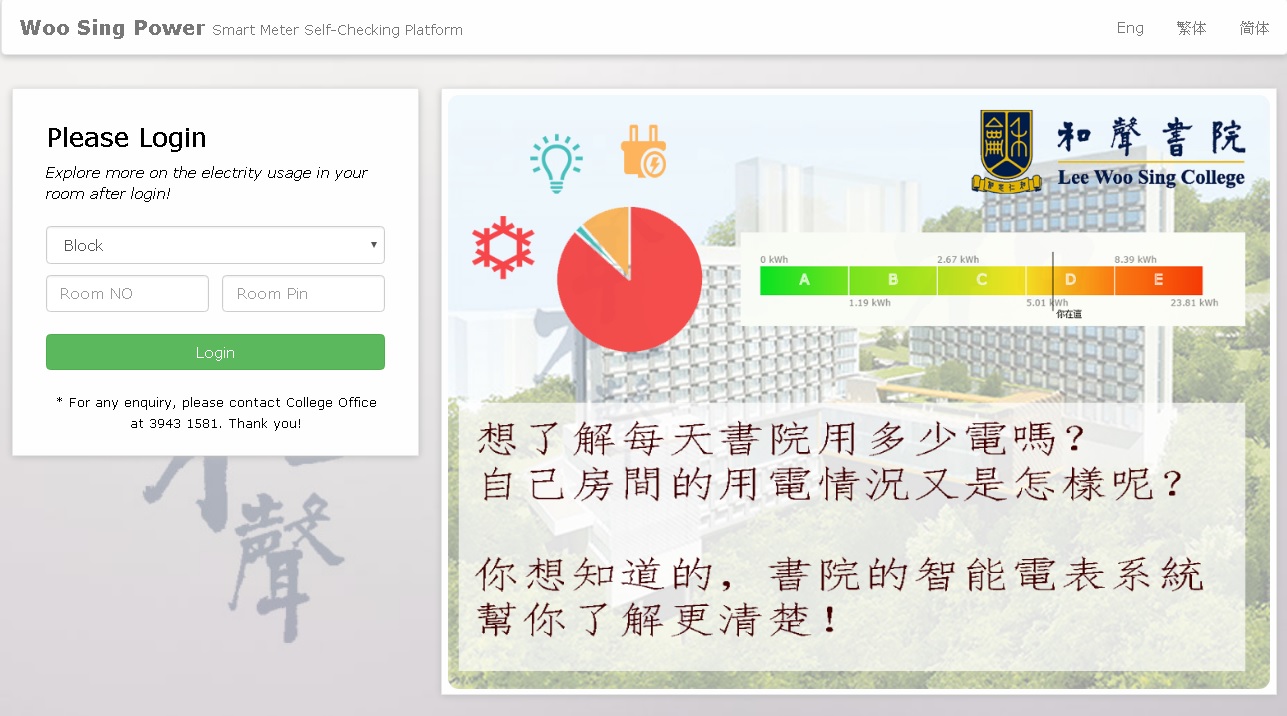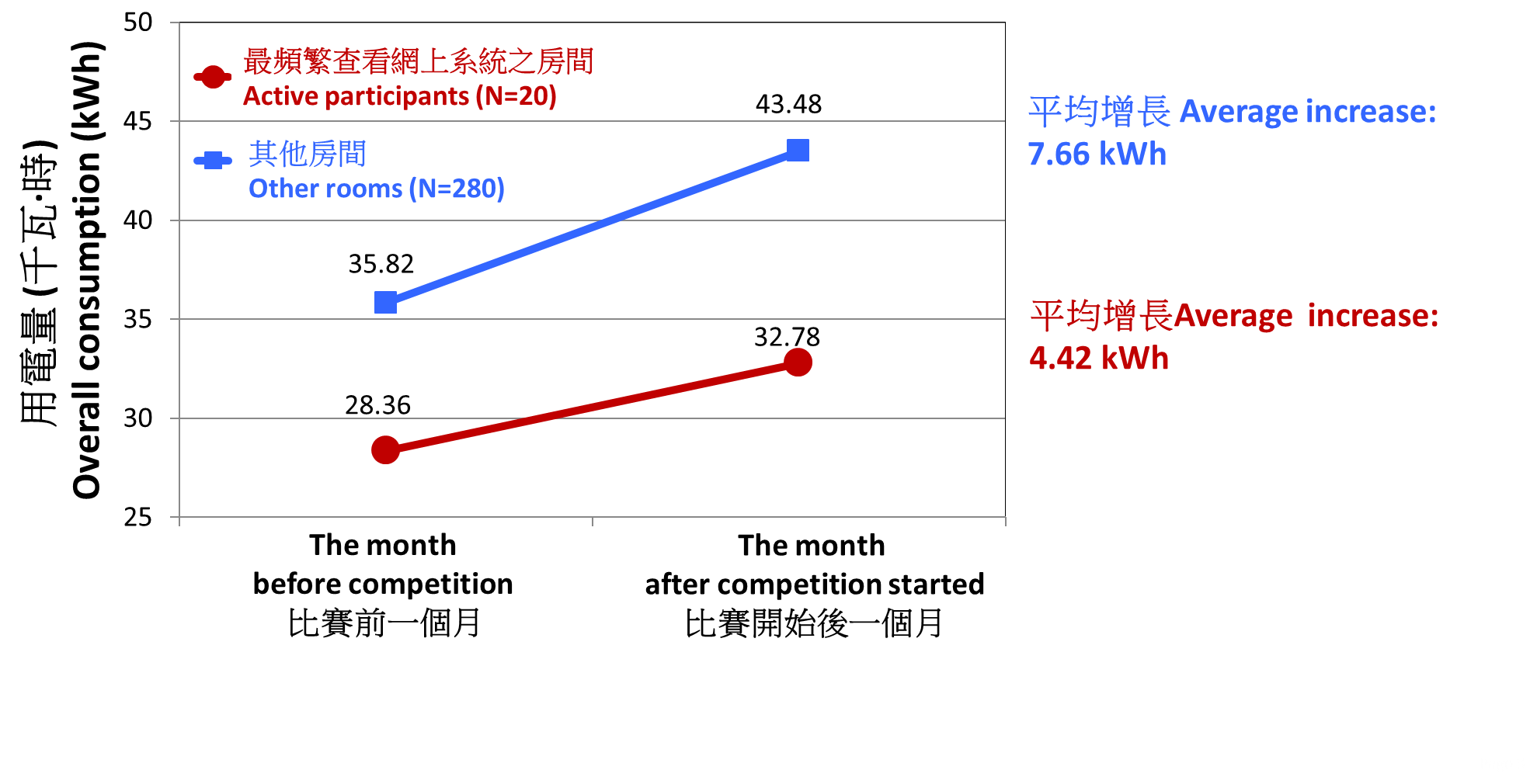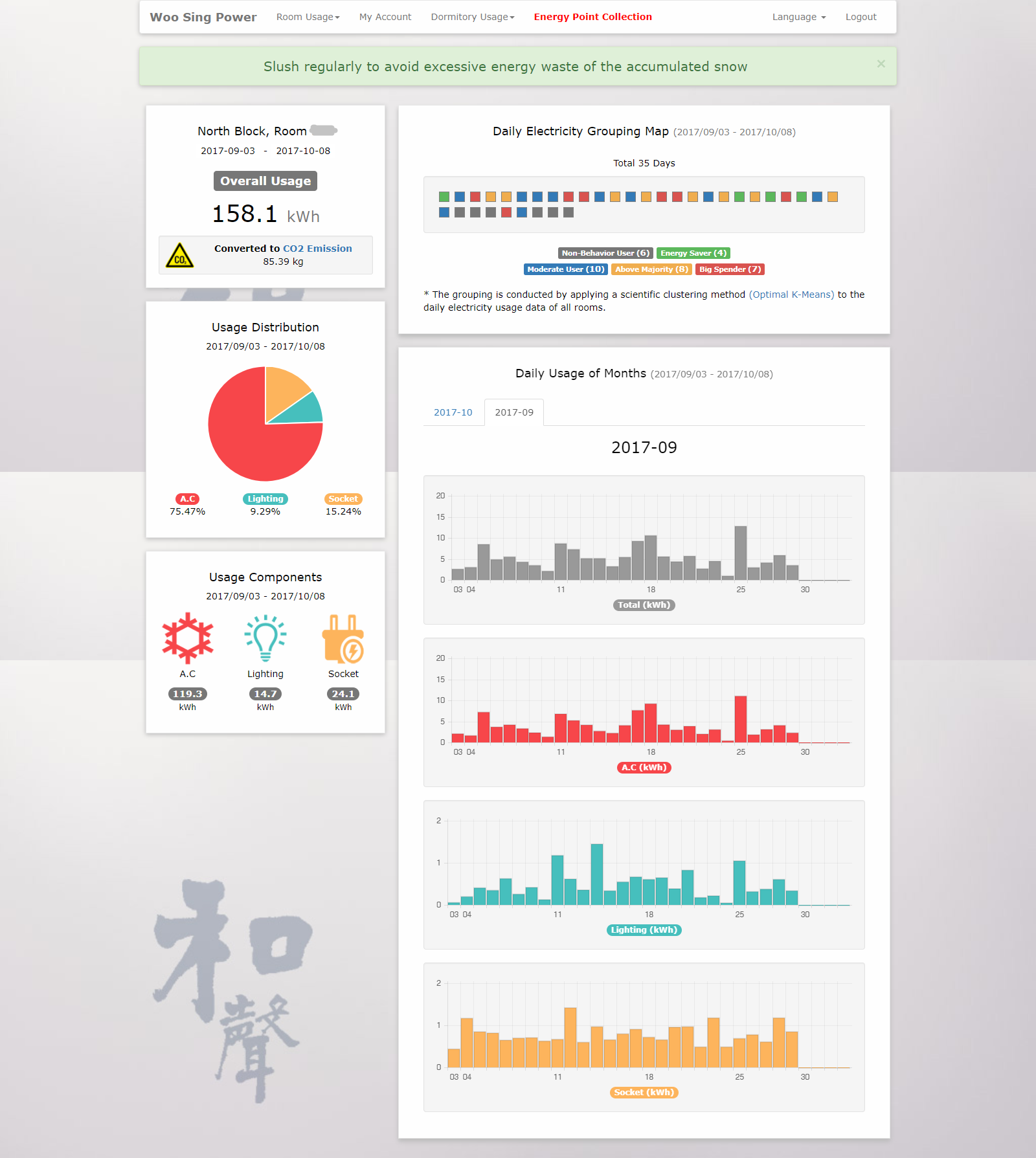Subtopic 5: Microgrid Monitoring, Management, and Comprehensive Security
智能化能源管理網上系統:「和聲 Power」
Smart Energy Management Online System: “Woo Sing Power”
合作伙伴: 香港中文大學 和聲書院
In collaboration with: Lee Woo Sing College, The Chinese University of Hong Kong
項目說明Project Description
中大和聲書院於電力管理上積極投資,在所有300個宿舍房間安裝了獨立的智能電錶,也在VRV冷氣系統、熱水系統及公共空間原有的電錶上安裝了監測系統,數碼監測用電數據。中大信息工程系榮休教授邱達民教授團隊根據宿舍房間的數據,設計了智能化在線能源管理網上系統「和聲 Power」(圖一),為數百位宿生提供實時回饋以鼓勵節能 (圖二),並為管理者找出節能機會及方案,成功提升宿生對個人用電量的關注及節能意識。
LWS College actively invested in smart buildings. They installed individual smart meters in all 300 dormitory rooms, as well as monitoring system in VRV air-conditioning systems and hot water systems in public areas to measure all electricity consumption data digitally. Based on the dormitory usage these data, research team of Prof. Dah Ming Chiu, Emeritus Professor of Department of Information Engineering, CUHK helped build a smart online energy management platform “Woo Sing Power” (Fig. 1), which provides instantaneous feedback to several hundreds of users to encourage energy conservation (Fig. 2), and to administrators to find opportunities and policies to save energy. The platform successfully raised the awareness of the students in energy consumption and conservation.

圖一. 邱達民教授團隊設計的能源管理網上系統:「和聲 Power」。
Fig. 1. The Smart Energy Management Online System “Woo Sing Power” developed by the team of Prof. Dah Ming Chiu.
相對分組法 Group-based feedback system
傳統上,同學對自己的用電量是沒有實時回饋,書院電費是採用「漸進增值費率」,即當用量超越某水平,每單位電價便較高;可是,此水平的釐定往往難以客觀定義,亦沒有考慮到天氣對用戶所需用電量的影響。故此,團隊構思了新的分組法讓同學清楚自己的用電量與其他同學的比較:以當天行為模式的相似度歸納為四個相對組別,包括「低」、「中」、「平均以上」及「高」。在天氣炎熱時,冷氣需求及整體用電較高,但組別仍是與其他用戶相對而得,不受天氣影響;故此法較為客觀,也更切合實際。團隊亦根據此系統設計了相應的定價機制,概念以同學整體社會規範以鼓勵省電行為,減低碳足跡。
Traditionally, there is no such feedback for users; and, the monthly pricing scheme in the College is based on “Progressive Pricing Policy - when the usage reaches certain threshold, usage is charged at a higher price. However, it is never clear what the right threshold for higher prices is, and the weather influence (hence user need) is not taken into consideration. In view of this, “Woo Sing Power” introduced a group-based feedback system to allow the users know their usage pattern compared to others: Users are grouped daily according to similarity of their usage behavior into four relative groups – “Energy savers”, “Moderate users”, “Above majority”, and “Heavy users”. On a hot day, the air condition need is high, so overall energy usage is higher, but users still get feedback on their relative usage compared to their peers. The data driven approach makes this scheme more objective and practical. The research team further proposed a pricing scheme based on the same group-based feedback system. The whole idea of group-based feedback and pricing relies on the idea of social norms to encourage good behavior towards energy conservation and carbon footprint reduction.
圖二. 「和聲 Power」用戶介面。這系統為超過600位宿生供實時回饋以鼓勵節能,並為管理者找出節能機會及方案,成功提升宿生對個人用電量的關注及節能意識。
Fig. 2. User interface of ”Woo Sing Power”. The system provides instantaneous feedback to more than 600 users to encourage energy conservation, and to administrators to find opportunities and policies to save energy.
省電比賽 Energy saving competition
2017年2月至4月,團隊為同學設計了省電比賽,得分除了用電量,也以登入及檢視系統的頻繁程度為額外分數。比賽結果顯示,在該段天氣漸趨炎熱的日子,最頻繁查看網上系統的20個房間及其餘280個房間,雖然用電量均有增長,但前者的平均增幅 (4.42 kWh) 只有後者 (7.66 kWh) 的四成 (約42.3%),可見參加比賽的同學,省電意識有所提升 (圖三)。和聲書院的這個試驗計劃,為整所大學成立了很好的階模。 During Feb – Apr During Feb – Apr 2017, the team designed an energy saving competition for the students. The competition points were obtained by both good energy saving behavior (measured by the group based ranking), as well as the frequency of logging in and viewing the daily feedback. During the month (Feb to Apr) when the weather was getting hotter, it was found that although both the participant group (N=20) and non-participant group (N=280) have an increase in electricity consumption, the average increment of the former (4.42 kwh) was only around 42.3% of the latter (7.66 kwh), which showed that the participants had a higher awareness in energy conservation (Fig. 3). The LWS College trial project is setting a good example for the whole university.

圖三. 省電比賽結果顯示,在該段天氣漸趨炎熱的日子,最頻繁查看網上系統的20個房間及其餘280個房間,雖然用電量均有增長,但前者的平均增幅 (4.42 kWh) 只有後者 (7.66 kWh) 的四成 (約42.3%),可見參加比賽的同學,省電意識有所提升。
Fig. 3. Result of the energy saving competition showed, during the month (Feb to Apr) when the weather was getting hotter, it was found that although both the participant group (N=20) and non-participant group (N=280) have an increase in electricity consumption, the average increment of the former (4.42 kwh) was only around 42.3% of the latter (7.66 kwh), which showed that the participants had a higher awareness in energy conservation.
相關文獻 Related Papers:
- Lei Zhan* & Dah Ming Chiu*. (2015). Encouraging Energy Conservation in Campus Dormitory via Monitoring and Policies. e-Energy '15 Proceedings of the 2015 ACM Sixth International Conference on Future Energy Systems, July 14–17, 2015, Bangalore, India. [Link]
Copyright © 2014 Faculty of Engineering, The Chinese University of Hong Kong. All rights reserved.

